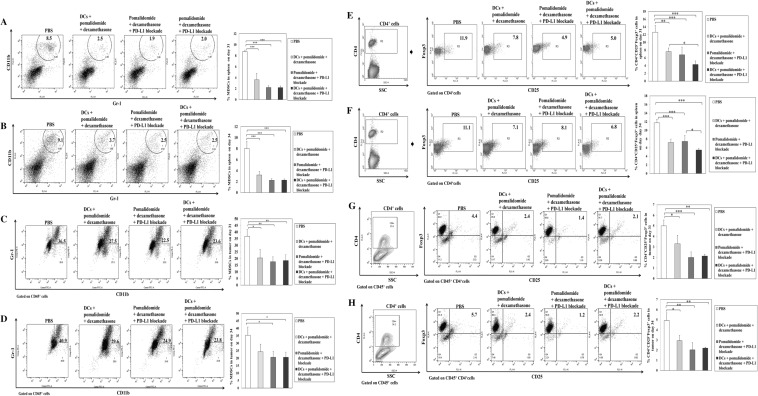Fig. 6.
Inhibition of myeloid-derived suppressor cells (MDSCs) and regulatory T cells (Tregs) in the spleen and tumor microenvironment of mice treated with DCs plus pomalidomide with dexamethasone and PD-L1 blockade. Using flow cytometry, we measured the proportions of MDSCs (CD11b+Gr-1+) and CD4+CD25+Foxp3+ Tregs in the spleen and tumor microenvironment of mice at days 31–34 after treatment. The proportions of MDSCs and Tregs were significantly increased in the PBS control and DCs + pomalidomide with dexamethasone groups compared to the groups treated with pomalidomide/dexamethasone + PD-L1 blockade. Pomalidomide with dexamethasone + PD-L1 blockade treatment decreased the generation of MDSCs in the spleen (a, b) and tumor microenvironment (c, d) compared to the PBS control and DCs + pomalidomide with dexamethasone groups (*, P < 0.05; **, P < 0.01; ***, P < 0.001). (e, f) The proportion of splenic Tregs was significantly decreased in the DCs + pomalidomide with dexamethasone + PD-L1 blockade treatment group compared to all other groups (*, P < 0.05; **, P < 0.01; ***, P < 0.001). (g, h) The groups treated with pomalidomide/dexamethasone + PD-L1 blockade exhibited significantly lower proportions of Tregs in the tumor microenvironment compared to the PBS control and DCs + pomalidomide with dexamethasone groups (*, P < 0.05; **, P < 0.01; ***, P < 0.001). These findings suggested that DC vaccination + pomalidomide with dexamethasone + PD-L1 blockade enhanced therapeutic anti-myeloma immunity by inhibiting immunosuppressive cells in the spleen and tumor microenvironment of treated mice during the vaccination phases. Data are representative of at least three experiments

